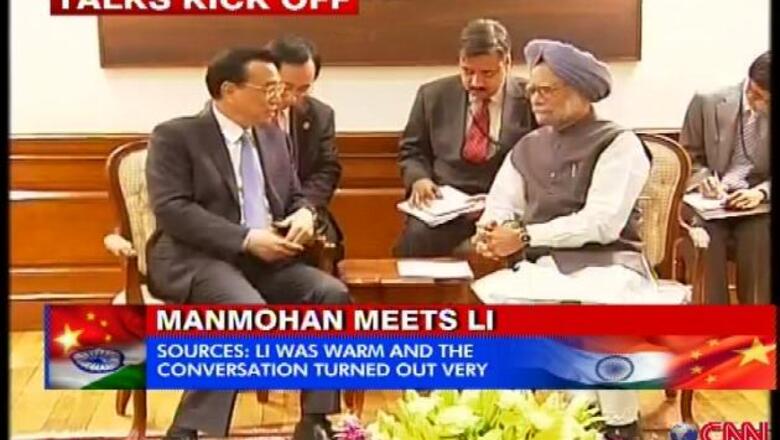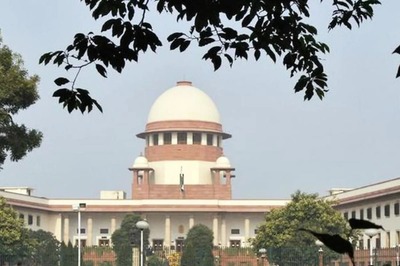
views
Coming at a time when mutual trust between the two countries is not at a significant high, what are the major takeaways for India from this high-profile visit? Alka Acharya, director of Institute of Chinese Studies, joined IBNLive readers for an interaction on the matter.
Q. Dear Madam, Do you think that it will be an advantage for India if its relationship with China improves after the Chinese Premier visit and it will also have its impact for better co-operation from Pakistan since there is also a change in government? Asked by: Raaj
A. There can be no doubt that an improved Sino-Indian relationship will not only be beneficial for the two countries but for the region as a whole, and specifically Pakistan. It is clear that when our own relationships with our neighbors deteriorates, there is greater scope for them to use China as a countervailing force. If we have a good stable relationship with our smaller neighbours they will feel less reluctant to bring in external factors. Similarly, China's relationship with Pakistan has also undergone slight shifts as its ties with India have become better - they have to take a more neutral stance -- with new govts in both China and Pakistan there could be some interesting changes towards greater stability.
Q. China has grown rapidly economically and militarily after its war of 62 with India as it found new confidence although it gives credit to liberalisation process of 70s that it initiated so is China more dangerous than pakistan as it is just like second superpower and is less defamed than Pakistan relating to terrorism. Asked by: Ravi
A. China has certainly amazed the world with its awesome economic progress - but is is dependent on the global economy and globalized economic scenario and has become more interdependent in its relationships with the world; secondly, it is still facing enormous challenges from within - its development has also a less positive side and it still requires a long period of stability and grown to reach the standards of the western countries. It is therefore not likely to embark on policies which could destabilize its neighborhood or mar its relationships with its neighbors in a major way. Besides, terrorism is a double edged sword which could end up harming Chinese interests in Xinjiang.
Q. Is the Premier's visit merely to increase China's exports to India, this by tactics of border intrusion by the Chinese army? Will India succumb to this tactic. Asked by: satish
A. The Chinese premier's visit is part of the process of high-level exchanges that were agreed between the two countries - it is part of the increasing, broadening and diversifying India-China relations - trade has been on the upswing since 2003 - it has been a major objective of the two countries - an ongoing process - but India has been pressing the Chinese side to address our concerns regarding the trade deficit and how to reduce that - increasing trade is in the interests of both countries - China is India's largest trading partner today.
Q. How much is the present issue different from Kargil and can govt take Chinese premier at face value as he is a diplomat and would evade the issue. Asked by: Ravi
A. The intrusions n the DBO are of an entirely different nature from Kargil -- I wish we had some informed debate on this episode - so many conjectures and speculations are floating - it is also difficult to imagine that our officials will not be keen to get an official explanation - they too would be pressing the Chinese side to address the matter -- the PM has also raised it with the Chinese premier -- I do not think that we will be satisfied with evasive tactics.
Q. What are the major takeaways for India from Chinese Premier Li Keqiang's India visit? Asked by: Honey
A. I believe that the importance of taking this relationship in its overall perspective has been highlighted -- the new Chinese leadership is clearly focussed on raising the levels of its engagement with India - trade is increasing - we are cooperating in a large number of bilateral, regional and global issues - the ambit of our strategic dialogue is also enlarging - and we are able to speak to each other more frankly on a large number of sensitive issues. We need to focus on the positives more.
Q. Is it possible that Pakistan and China are creating an alliance for creating nuisance from India's perspective as both are difficult countries to deal with Asked by: Manav
A. The world is not only interacting with China but is very eager to promote and further its cooperation and relationship - we have to understand the reality that is fast transforming our immediate environment -- there was a time when Pakistan was being actively used by China - but we have moved a great distance -- we need to see the changes in China's Pakistan del.ship and see how to capitalise on them - China is also having its own concerns with Pakistan - so the question of an alliance between them just to spite India appears a bit farfetched -- quite apart from not making strategic sense.
Q. Why is the govt too soft when it can use water cannons and teargas shells or firing to dispel civilians in protest like in Delhi or in Singur but is afraid of China as they will get into a war and they might lose the battle? Asked by: Shailesh
A. War between states is not like using water cannons on civilians -- you cannot turn off the tap at will and hope everything will settle down. You have to make a clearheaded assessment of the strengths on the other side before starting a war -- ofcourse there is a huge asymmetry of power between us - -and then the more important question is - what is the purpose of the war? do we think we can settle the dispute by war -- you will still have to get down to negotiation.
Q. Is the Mcmohan line an real border between two countries as China has been extending its border beyond it by thousands of miles according to its desires? Asked by: Hitesh
A. This is a completely uninformed view and totally incorrect. There is no mutually accepted or agreed boundary between us -- we do not even have a mutually acceptable Line of Actual Control.
Q. Has Manmohan made a mess of it by saying that it is localised problem as reports suggest it is role of PLA and thousands of miles of land has been captured from Indian army for strategic purpose? Asked by: Manush
A. I think we should take positions only after understanding the actual situation - by suggesting that it is localized, the PM conveyed the signal that it should be sorted out at the local level - that it was somewhat more serious still does not detract form the fact that it was to ultimately be addressed by the commanders of that area - and the PLA has certainly not captures 1000s of miles........status quo ante was restored after both sides agreed to get back to their original positions.
Q. Is the UPA govt too soft on border issue as it knows that general public has no idea on the issue and LAC and wants to be soft with China as it feels it would be another embarrassment for the govt which already has too many failures in its kitty. Asked by: Manav
A. The fact that the UPA has been in power for nearly 10yrs now and there is no solution to the dispute means that both sides are obviously having a hard time negotiating an extremely complex issue -- this perception of being soft is bizarre for it suggests that unless we shout from the rooftops we are not taking a firm position.
Q. Who is to blame for present mess Govt or Army as both are corrupt at own levels and army does not have modern weapons to fight at borders and govt only knows to celebrate 26 January in Delhi. Asked by: Arvind
A. An unsettled boundary and differing perception of the Line of Actual Control is the problem. We been to have a legally demarcated, mutually acceptable resolution of the dispute. The question of corruption and lack of weapons is a different issue - of course many times threats are hyped up to force more arms deals - we have to do much more serious introspection about that.
Q. Should trade be determinant to border issue as India still imports quite a lot and figures are in China's favour? Asked by: Hitesh
A. We must seriously get down to sorting out the unsatisfactory aspects of the Sino-Indian trade - there is so much more potential here which will be to the advantage of large numbers of people in both countries - we can learn from China's superior achievements in infrastructure - we can share technology that is more suitable to our level of development instead of spending huge amounts to buy from the west - we can exchange our experiences in the matter of environmental issues ----there is a world to do out here.



















Comments
0 comment